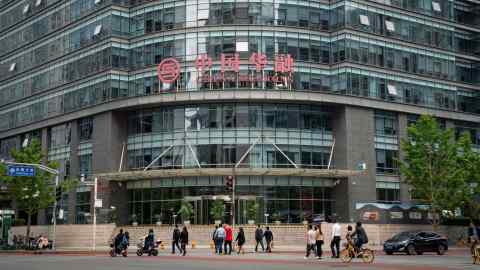[ad_1]
Shares in the main unit of Suning have been suspended as financial woes at the Chinese retailer and owner of football club Inter Milan’s escalate, underscoring pressures in the country’s credit markets.
The halt in the group’s Shenzhen-listed stock on Wednesday came after a Beijing court this week ordered a freeze on more than a quarter of founder Zhang Jindong’s shares in Suning’s retail arm. The shares had tumbled 10 per cent — the exchange’s maximum one-day price movement — a day earlier.
Suning is one of a clutch of Chinese conglomerates including property group Evergrande and distressed debt investor Huarong that are being closely watched by investors. Some are concerned over risks potentially spreading through the financial sector.
The liquidity difficulties at Suning, which owns the Carrefour chain of supermarkets in China and is part-owned by Jack Ma’s internet group Alibaba, comes despite the group receiving billions of dollars via bailouts from state-linked funds and bond repayment extensions over recent months.
According to S&P, the company’s debt stood at more than $6.6bn at the end of the third quarter last year, with about two-thirds in short-term obligations. The rating agency noted that Suning’s online business has been hit by squeezed margins while Covid-19 hurt sales at its bricks and mortar stores.
Jiangsu-headquartered Suning declined to comment.
Zhang’s debt problems have also focused attention on the relationship between Suning and Evergrande, the world’s most indebted property developer.
Suning, which started life in 1990 as a home appliances retailer before mushrooming with scores of subsidiaries and related companies, was financially hit by its Rmb20bn ($3.1bn) investment in a mainland Chinese subsidiary of Evergrande in 2017.
It was entitled to reclaim that investment if the Evergrande subsidiary did not list on Shenzhen’s stock market by early 2021. Suning declined to demand its money back late last year when it became clear the listing would not materialise.
Evergrande’s shares have fallen 29 per cent this year and were volatile in 2020 on fears of a cash crunch.
The company has been pressured by the Chinese government’s introduction last year of its so-called “three red linesâ€, which restricts credit to large developers.
Those constraints are part of a broad tightening of credit conditions in China, with investors concerned about the prospect of more offshore defaults after they rose last year.
Last week, Bloomberg News reported that regulators in China had told lenders to carry out stress tests on their exposure to Evergrande.
Analysts are also closely tracking China’s state-backed distressed debt managers. Last week, Beijing’s financial watchdog said it was investigating a senior official at one of China’s biggest so-called “bad debt†banks for graft, a new sign of possible misconduct in the sector. Huarong, the country’s biggest distressed debt investor, owes about $22bn of dollar-denominated debt and its bonds have whipsawed following its failure to file its most recent annual results.
Analysts at Fitch noted that “defaults and financial distress†among large Chinese corporate debt issuers had contributed to a “surge†in domestic rating downgrades this year.
“The number of downgrades and downgraded corporates in [the first four months of 2020] already matched . . . full-year 2020 levels,†the analysts said, adding the uptick was “not usualâ€.
Additional reporting by Sherry Fei Ju in Beijing
[ad_2]
Source link






